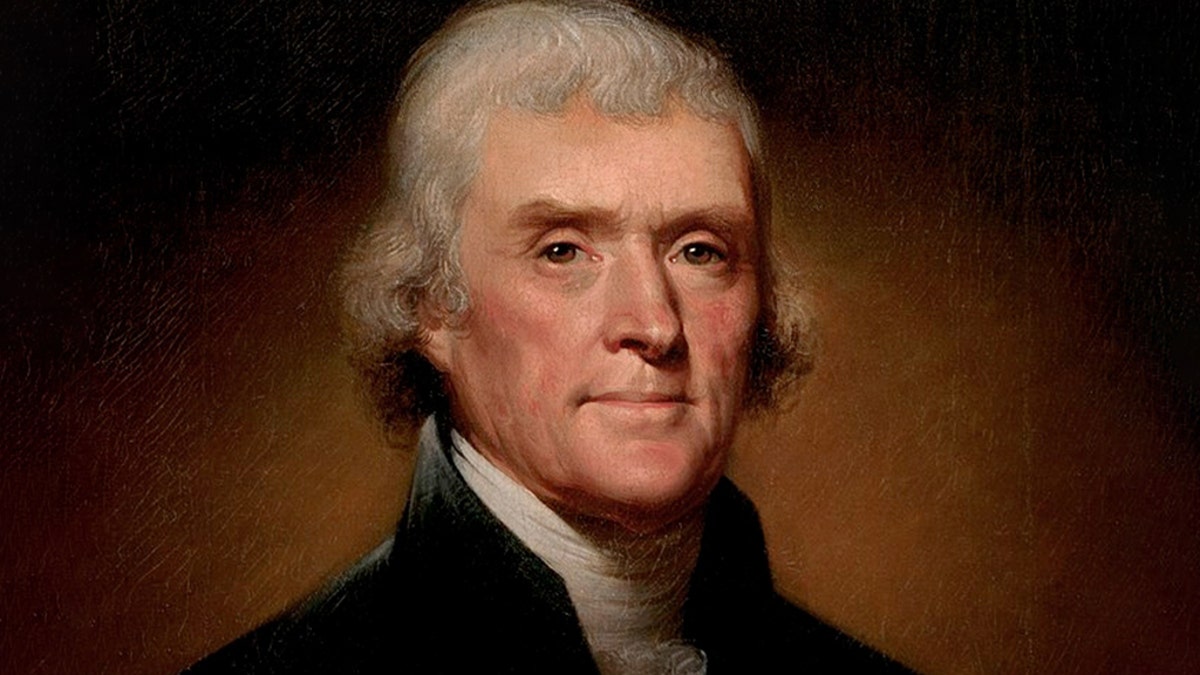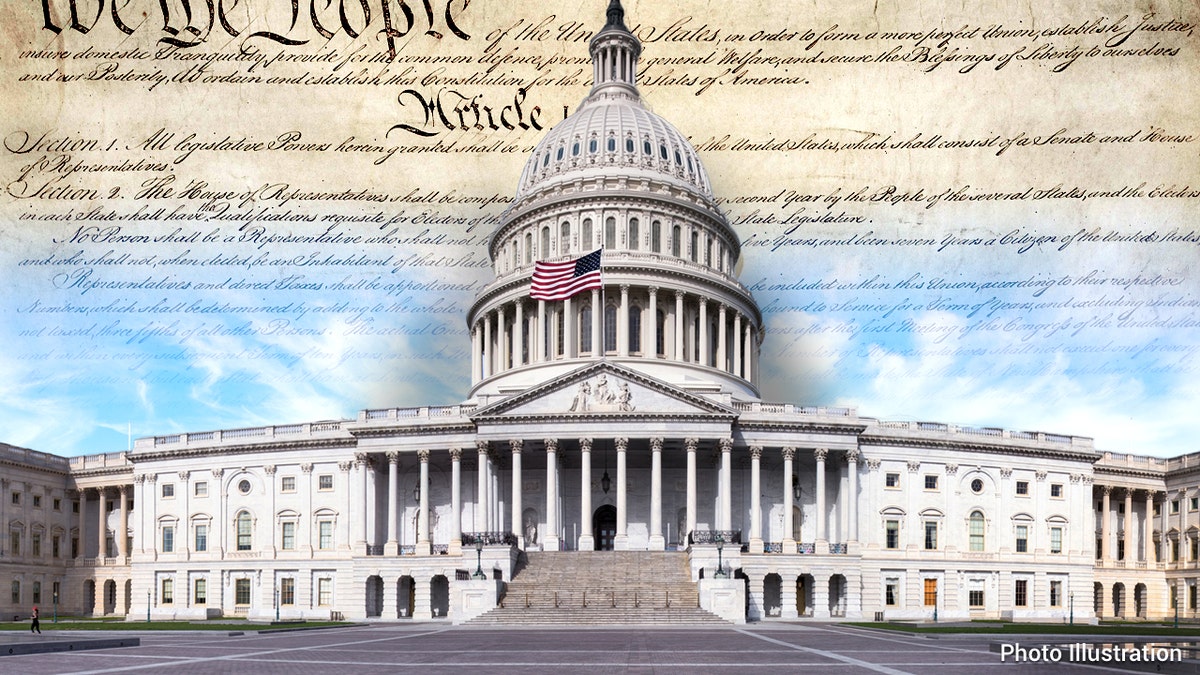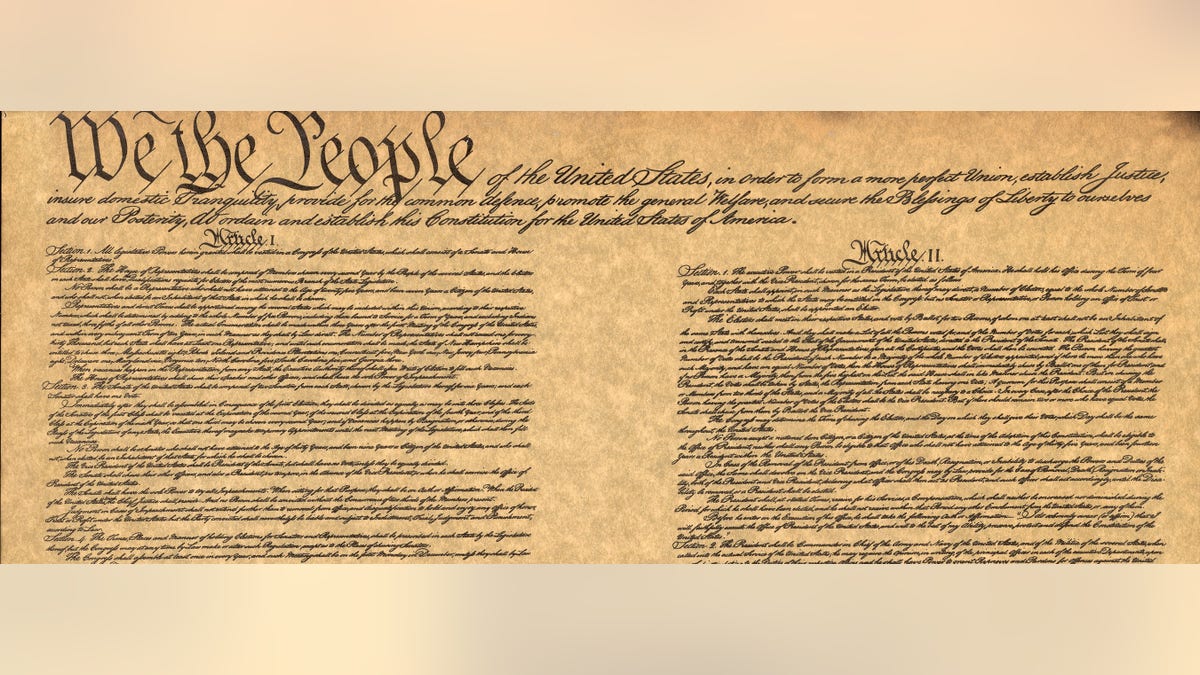Atlantic Flag & Pole offers American-made flag poles ahead of 4th of July
Home improvement expert Skip Bedell joined 'Fox & Friends' to discuss the types of flags they offer ahead of Independence Day.
If you are in Philadelphia this 4th of July weekend — the city where the Founding Fathers met, debated and adopted the Declaration of Independence — you may see Thomas Jefferson milling about, chatting with fellow citizens and preparing to take part in an important reading ceremony on Constitution Avenue.
That "Thomas Jefferson" is actually Steve Edenbo — a man who has dedicated his professional career for more than 20 years to impersonating Jefferson and sharing the third president's ideas and philosophies with the current generation.
"I am definitely working on the 4th!" he told Fox News Digital about this Independence Day weekend.
4TH OF JULY QUIZ! HOW WELL DO YOU KNOW INDEPENDENCE DAY?
Just ahead of the holiday, Fox News Digital spoke to Edenbo, who lives in Philadelphia (and yes, he'll be quite busy this weekend) to ask him what it’s like to portray Jefferson as a character — and what the wisdom of our nation’s third president offers us today.
Fox News Digital: Tell us what you're doing this 4th of July weekend?
Steve Edenbo: American Historical Theatre is again bringing the Founders to the U.S. National Archives for their public 4th of July festivities, which include a public reading ceremony on the Constitution Avenue side of the Archives.
This is our first time back since COVID shut down all public performances in 2020, and we're thrilled. It will be my 22nd Independence Day with the National Archives.
American Historical Theatre has been working with the Archives on this event since before I started in 1999 — but I'm not sure when that partnership started. At this point it's at least a quarter-century.
Fox News Digital: Why did you choose this as a career?
Steve Edenbo: When I started doing this almost 23 years ago, I quickly found that I loved all the parts of it. This job is a mixture of study, scholarship, writing, teaching, acting, traveling — I love to travel! — and inspiring people, too. I fell in love with my work early on.
4TH OF JULY: WHAT IS IT AND WHY DO WE CELEBRATE WITH FIREWORKS?
When you take on these prominent figures, you must have some connection with them. You find parts of yourself within the characters, like actors do.
You’re also in constant conversation with that figure, which I have found to be stimulating, ever-challenging and sometimes frustrating. The further you get into the forest, the bigger the trees — it becomes more complicated.

Our actual third president, Thomas Jefferson, in an official presidential portrait (by Rembrandt Peale, Dec. 31, 1799). (Public Domain)
Jefferson is in the middle of all the big issues [in our country] in a way that no other Founder is — and while that’s a challenge, it’s also what makes this work interesting and makes Jefferson, for better and for worse, still very relevant.
Fox News Digital: Tell us how you got your start in this work.
Edenbo: I attended Dickinson College [in Carlisle, Pennsylvania] as an English major and took some acting courses there. I moved to Philadelphia to pursue acting and got involved with Philadelphia’s American Historical Theatre.
A key person there saw my physical resemblance to Jefferson — and then learned that I am an avid reader and writer. A "Jefferson" was needed for conferences and conventions. I fell in love with the whole thing.
I am now on the board of the American Historical Theatre, trying to give back — they gave me my start. We tell a wide array of stories of historical figures, and if you’re approaching history through every means available, this is yet another way in.
Fox News Digital: Give us an idea of the types of gigs you have.
Edenbo: All kinds, from leadership conferences for Fortune 500s to debating on stage.
I work with the FBI twice a year, which goes into my "most challenging" category. I started doing leadership conferences for them about five years ago, as well as seminars for police chiefs from around the country and the world.

Steve Edenbo as Thomas Jefferson (right) in conversation with Alexander Hamilton (Eben Kuhns); costumes are by Kim Hanley of American Historical Theatre. Said Edenbo to Fox News Digital, "I personally view history as having an intrinsic value." (Courtesy Steve Edenbo)
Parts of these seminars have an American constitutional focus, and for one of the events they bring the chiefs to Monticello — where they meet "Thomas Jefferson."
AMERICA THE BEAUTIFUL: 50 MUST-SEE LANDMARKS THAT TELL OUR STORY
I personally view history as having an intrinsic value. The challenge is, how do you reach folks who are busy protecting us — like the FBI?
How do you bring this history to them? It’s the same question I have if I'm talking to Fortune 500 CEOs or 8th graders. How do you reach them where they are?
If you tell 8th graders why they’re supposed to care — you lose them. You must figure out what matters to them; then you connect history to that.

The real Thomas Jefferson. "Sometimes the things I have to say to represent Jefferson accurately I agree with personally — and sometimes I disagree personally," said Steve Edenbo to Fox News Digital about his work as a Jefferson impersonator and character actor. (Universal History Archive/Universal Images Group via Getty Images)
Fox News Digital: Can you reveal the types of feedback you receive when you're playing Jefferson?
Edenbo: There’s a range. I was terrified the first time I performed for the FBI — I really wanted to get it right for them, because they risk their lives for us.
"I also get people who are angry at me. Of course, they’re angry at Jefferson and parts of his legacy. But in a way, it’s a compliment."
After one presentation the FBI members invited me out for fried chicken at a restaurant near Monticello, and that is one of the sincerest compliments I’ve ever gotten!
I also get people who are angry at me. Of course, they’re angry at Jefferson and parts of his legacy. But in a way, it’s a compliment — they will challenge me while I’m in character, and I’m on the hot seat.

Thomas Jefferson impersonator Steve Edenbo is shown here, in character and in costume. "If someone tries to talk about a modern issue, I try to respond with an historical analogue," Edenbo told Fox News Digital. (Karla Korn)
I invite it — Jefferson would also invite it, this challenging of our history and engaging with our history.
If someone tries to talk about a modern issue, I try to respond with an historical analogue — an historical example, event or situation that exemplifies a pattern that we continue to see. We see the pattern repeating. And while there’s no one-size-fits-all solution, we can study how people of the past engaged with that scenario.
CELEBRATE THE 4TH OF JULY WEEKEND IN BOSTON: ‘ALL ABOUT TRADITIONS’
It can benefit us to name and acknowledge the [Founders'] failures as warnings, and their successes as examples, that we can pick up and use again.
Using an analogue also keeps my own politics out of it — it keeps me from falling into the trap of making Jefferson a mouthpiece for my own personal politics.
"I often say this at leadership conferences: ‘Anyone who refuses to talk about their failures should not be listened to when they talk about their successes.’"
I vote, and I participate in democracy, of course. Sometimes the things I have to say to represent Jefferson accurately I agree with personally, and sometimes I disagree personally.
I often say this at leadership conferences: "Anyone who refuses to talk about their failures should not be listened to when they talk about their successes."
Fox News Digital: Share with us Jefferson’s thoughts on the Constitution — and how you share these with your audiences.
Edenbo: Jefferson believed that the Constitution and the United States and the world belong to the living generation — not the dead.

The Constitution is shown in the background, with the Capitol building in the foreground here. (iStock)
Jefferson used a legal term — usufruct — for this idea, saying, "The world belongs to the living in usufruct." This means that you have the right to use something — this word combines the Latin words for "use" and "fruit" — you have the right to use the fruit of something, and benefit from it, but not in such a way that it destroys the thing itself and destroys the ability of those who come after you to enjoy it in the same way you did.
The earth belongs to the living in usufruct, and America belongs to the living in usufruct. We should enjoy our liberties, but not in a way that destroys them for those that come after us.
Jefferson went farther than I can go personally with some of his ideas. He thought we should have a Constitutional Convention every generation.
I like that passion, but that’s just not going to work.
"We should enjoy our liberties, but not in a way that destroys them for those that come after us."
He took his ideas really far, and James Madison [known as the Father of the Constitution] would pull him back and was a ballast to him. Madison was a much more tactical thinker, constitutionally.
This idea is very Jeffersonian: If we look at the Constitution as a permanent, unchangeable document, and we look at the Founders as prophets to be lauded and almost worshipped, it’s going to turn us into a Tower of Babel — dividing us instead of unifying us.
Of course, the other extreme would be: These guys [the Founders] are just these old fuddy duddies, and the Constitution doesn’t work anymore, and then its words become meaningless; we are no longer a nation of laws over the will of men.

A facimile of the Constitution of the United States of America. (Fotosearch/Getty Images)
Jefferson said that we have to interpret the Constitution, certainly — but warned that "eventually the patchwork will overtake the garment" if we didn't change the Constitution enough by means of a full convention.
This quote is engraved on the Jefferson Memorial in Washington, D.C., and explains Jefferson’s thinking: "We might as well require a man to wear still the coat which fitted him when a boy as civilized society to remain ever under the regimen of their barbarous ancestors."
CLICK HERE TO GET THE FOX NEWS APP
Jefferson certainly believed that we must make new suits of clothing every generation.
On the 4th of July, these words of Jefferson ring true: "All eyes are opened, or opening to the rights of man. The general spread of the light of science has already laid open to every view the palpable truth, that the mass of mankind has not been born, with saddles on their backs, nor a favored few booted and spurred, ready to ride them legitimately, by the grace of God. These are grounds of hope for others. For ourselves, let the annual return of this day forever refresh our recollections of these rights, and an undiminished devotion to them."
(That's from a letter from Thomas Jefferson to politician Roger C. Weightman, Monticello — on June 24, 1826.)










































